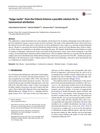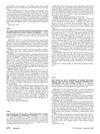 2 citations,
January 2019 in “Medizinische Genetik”
2 citations,
January 2019 in “Medizinische Genetik” The document reports findings on genetic research, including ethical concerns about genome editing, improved diagnosis of mitochondrial mutations, solving inherited eye diseases, confirming gene roles in epilepsy, linking a gene to aneurysms, and identifying genes associated with age-related macular degeneration.
[object Object]  2 citations,
January 2010 in “Hormone Molecular Biology and Clinical Investigation”
2 citations,
January 2010 in “Hormone Molecular Biology and Clinical Investigation” Low dose finasteride decreases certain steroids, possibly increasing depression risk.
 1 citations,
January 2010 in “Springer eBooks”
1 citations,
January 2010 in “Springer eBooks” Certain micronutrients may improve hair and nail health, but more research is needed to confirm their benefits.
 July 2018 in “Elsevier eBooks”
July 2018 in “Elsevier eBooks” New hair loss treatments show promise, but more research is needed to confirm their effectiveness.
 January 2017 in “Elsevier eBooks”
January 2017 in “Elsevier eBooks” Antioxidants may help improve mitochondrial health and could be used to treat diseases related to cell damage.
 November 2016 in “Elsevier eBooks”
November 2016 in “Elsevier eBooks” Genetic mutations can affect female sexual development, requiring personalized medical care.
 January 2015 in “Springer eBooks”
January 2015 in “Springer eBooks” Hormones affect skin aging, and treatments targeting hormonal balance may improve skin health.
3 citations,
October 2023 in “Cosmetics” Healthy lifestyle changes can significantly improve skin health as you age.
 August 2023 in “Military Medical Research”
August 2023 in “Military Medical Research” Scientists have improved 3D models of human skin for research and medical uses, but still face challenges in perfectly replicating real skin.
 January 2022 in “IntechOpen eBooks”
January 2022 in “IntechOpen eBooks” Some lesser-known causes of PCOS include autoimmune issues, genetic mutations, and changes in the body's microbiome.
 3 citations,
December 2016 in “Sexual medicine reviews”
3 citations,
December 2016 in “Sexual medicine reviews” The document concludes that better research methods are needed in men's sexual health to provide stronger evidence and improve patient care.
 4 citations,
September 2018 in “Rendiconti lincei. Scienze fisiche e naturali”
4 citations,
September 2018 in “Rendiconti lincei. Scienze fisiche e naturali” Researchers concluded that "spigo nardo" is the Himalayan plant Nardostachys jatamansi, used historically in medicine and cosmetics, now critically endangered.
 36 citations,
February 2011 in “Fertility and Sterility”
36 citations,
February 2011 in “Fertility and Sterility” Finasteride use may cause sperm damage and infertility, stopping it can improve sperm health.
 26 citations,
October 2014 in “Andrologia”
26 citations,
October 2014 in “Andrologia” Infertile men are more likely to produce sperm with abnormal chromosome numbers, which can affect pregnancy success and embryo health.
 4 citations,
September 2020 in “Andrologia”
4 citations,
September 2020 in “Andrologia” Oregano extract helps fix testis and sperm damage caused by finasteride.
2 citations,
March 2021 in “Reproduction” Finasteride may affect male fertility by interfering with specific sperm signaling.
 June 2022 in “Journal of Experimental Biology and Agricultural Sciences”
June 2022 in “Journal of Experimental Biology and Agricultural Sciences” Higher testosterone harms sperm motility, while higher estradiol improves sperm survival.
 April 2021 in “Animal Bioscience”
April 2021 in “Animal Bioscience” 5-Aminolevulinic acid can help chicken sperm move better at the right amount.
 October 2020 in “Journal of Pakistan Association of Dermatology”
October 2020 in “Journal of Pakistan Association of Dermatology” Finasteride appears safe for long-term sperm concentration, but more research is needed for clear conclusions.
 1 citations,
January 2018 in “PubMed”
1 citations,
January 2018 in “PubMed” Women with PCOS have a similar chance of getting pregnant using assisted reproductive treatment as those without PCOS.
 2 citations,
September 2008 in “Fertility and Sterility”
2 citations,
September 2008 in “Fertility and Sterility” Adult offspring of sperm donation generally feel positive about their conception and view the donor as their biological father.
 December 2023 in “Urogenital tract infection”
December 2023 in “Urogenital tract infection” Seminal bacteria can lower sperm quality in subfertile men.
 October 2017 in “Springer eBooks”
October 2017 in “Springer eBooks” A thorough initial check-up is essential before sperm banking to ensure the best chance of preserving good quality sperm.
 104 citations,
May 2019 in “F1000Research”
104 citations,
May 2019 in “F1000Research” Losing weight, fixing varicoceles, and using advanced sperm selection methods improve male infertility treatment outcomes.
 54 citations,
September 2013 in “Fertility and Sterility”
54 citations,
September 2013 in “Fertility and Sterility” Finasteride can reduce fertility in some men, but stopping it increases sperm count.
[object Object]  34 citations,
January 2004 in “Revista do Hospital das Clínicas”
34 citations,
January 2004 in “Revista do Hospital das Clínicas” Finasteride may worsen infertility in men with existing issues, but stopping it can improve sperm health.
16 citations,
January 2017 in “Asian journal of andrology/Asian Journal of Andrology” Men who start puberty later may have lower sperm quality and different hormone levels in adulthood.
 15 citations,
January 2017 in “Advances in Experimental Medicine and Biology”
15 citations,
January 2017 in “Advances in Experimental Medicine and Biology” 5α-Reductase inhibitors can negatively affect male sexual function and, in some cases, significantly reduce sperm count, but these effects may be reversible.
 15 citations,
October 2012 in “International Urology and Nephrology”
15 citations,
October 2012 in “International Urology and Nephrology” Low-dose finasteride may cause fertility issues, but stopping it can improve sperm quality and lead to pregnancy.
 8 citations,
December 2016 in “Revista Medica De Chile”
8 citations,
December 2016 in “Revista Medica De Chile” Finasteride can cause sexual dysfunction, sperm changes, and affect bone density and metabolism.


























